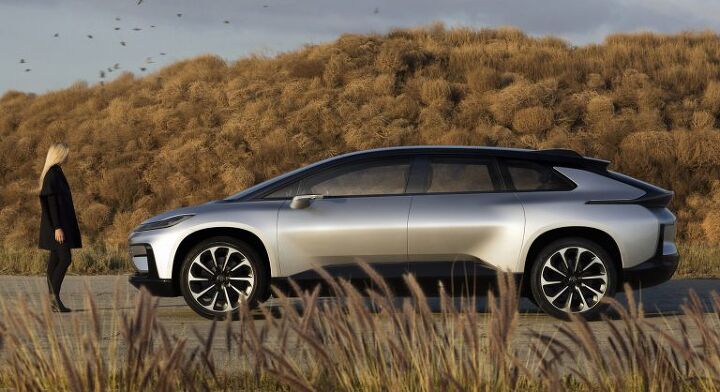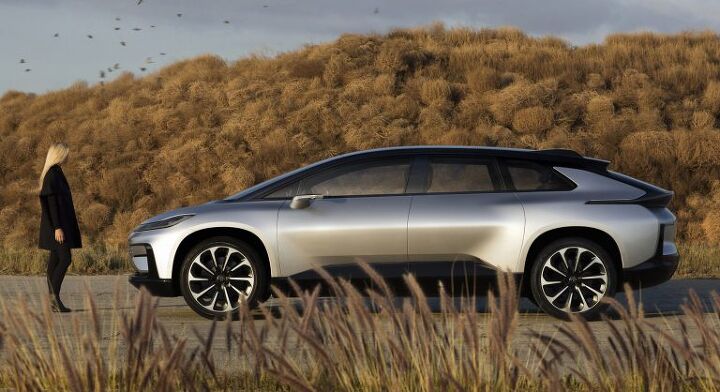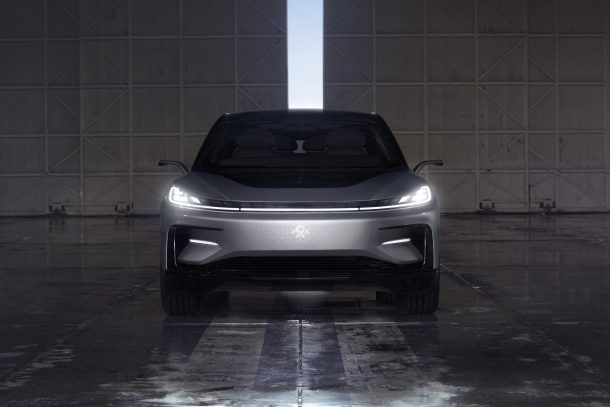#JiaYueting
SEC Subpoenas Faraday Future Executives
Several executives from perpetual automotive startup Faraday Future have reportedly been subpoenaed by the U.S. Securities and Exchange Commission as part of an investigation into inaccurate statements made to investors. Though, considering the nameplate’s history, it would be impossible to assume which item the SEC will be focusing on thanks to FF’s exceptionally long history of industrial misgivings.
We’ve covered Faraday Future’s long and bizarre story from the early days of delivering half-baked, though otherwise impressive, concepts to its more recent status as an automaker in the ethereal sense. It’s promised the moon and only managed to deliver a handful of production husks that never surpassed the body-in-white phase and some “production-intent” prototypes of the FF91. Though the larger story is the SEC’s sudden interest in electric vehicle startups that went public via mergers with blank check firms, better known as special purpose acquisition companies (SPACs), over the last two years.
Faraday Future Returns, Discusses Going Public With Reverse Merger
Faraday Future is hoping to go public through a reverse merger, proving that the finances associated with electric vehicle startups rarely operate within the confines of reality. Founded by Chinese businessman Jia Yueting in April 2014, the company began making waves the following year when it announced a plan to invest over $1 billion a factory in Nevada (its first) and went on a massive hiring spree. With the help of millions in government tax incentives, the plan was to start building some of the world’s most advanced EVs by 2017.
But people were becoming suspicious as early as 2016, when questions were raised about where the money was coming from and how much was left. By year’s end, work on Faraday’s Nevada facility had been suspended indefinitely. Following a lightly-botched presentation of its future product in early 2017, more outlets began to report the company was quickly running out of money as it backed out of several more projects. Months later, an internal power struggle left founder Jia Yueting as the primary decision-maker. Faraday Future spent the next few years scrambling to repay its debts and scrounging for (mostly Chinese) investors that might get it closer to its ultimate goal of building cars.
Faraday Future Founder Files for Chapter 11
The founder of Faraday Future, Yueting Jia, has filed for bankruptcy and restructuring under Chapter 11 in the United States, according to a statement released by the company. The decision allows Jia (known within the company as “YT”) to address his debts in China, which can be measured billions, so his ownership of FF can be transferred to creditors.
Due to Faraday’s repeatedly broken promises and clandestine way of doing business, we’ve never had an overabundance of faith in the company. While that view hasn’t changed, the corporate statement frames Jia’s U.S. bankruptcy as a positive.
Faraday Future Teases Ultra-modern Minivan
Faraday Future is my favorite automaker and it’s not because they build the best cars. With the exception of a few prototypes of the FF91, Faraday hasn’t really built much of anything. But I’ve become enamored with the story of a mysterious automotive company, funded by a controversial Chinese backer, that continues to defy the odds by just surviving — despite a long history of ridiculous mistakes, financial shortfalls, and missed production targets. For me, its been a suitable substitute for soap operas.
The last time we checked in on Faraday, it had just broken ties with its savior-turned-destructor Evergrande. The company announced in January that it had agreed to restructure its $2 billion investment in FF and that both parties had acquiesced to drop all litigation against each other. Now Faraday is back with a new joint partnership and a new model — a minivan straight out of a late 20th century sci-fi flick.
Faraday Future Co-founder Calls It Quits; Majority Shareholder Has Odd Debt Solution
Faraday Future co-founder Nick Sampson has quit his executive post as the aspiring automaker continues struggling with finance issues relating to its latest financial backer and China’s second-largest real estate developer, Evergrande Group.
That leaves CEO Jia Yueting as the company’s only founding executive left on staff. But it would appear he might also leave, albeit under duress, if Faraday’s largest shareholder gets its way. While it’s not obvious exactly who shot first, the electric vehicle firm and Evergrande are at each other’s throats — ruining a $2 billion deal that was supposed to save the company and get its ambitious debut model, the FF 91, into production. Apparently, it was all too much for Sampson.
Faraday Future Confronting Layoffs, Pay Cuts, Probable Corporate Doom
Following a previous article about Faraday Future, the manufacturer reached out to yours truly to clarify a few things. First of all, the company deemed the headline and body a bit “jagged.” Understandable, as no manufacturer wants to be called “America’s Worst Automaker” by some bespectacled creep sitting behind a keyboard. Faraday’s spokesperson also noted that deliveries would not begin in December and that the vehicle fire we referenced was a “minor incident” involving a pre-production model undergoing testing at the firm’s Hanford manufacturing facility.
Actually, that makes things sound a little worse than initially reported, as it appears the company doesn’t have a production date anymore. But I will acquiesce that I could have been clearer with that’s going on with its new financial backer, Evergrande. The pair have been at each other’s throats over money for a while, which is important because the spat is now costing people their jobs. We really need to get into the nitty gritty as to why.
Checking In With Faraday Future, America's Worst Automaker
Faraday Future’s summer fling with Chinese real estate group Evergrande, which invested $800 million into the company last June, appears to be over. The “automaker” is allegedly trying to back out of its arrangement after its CEO and founder, Jia Yueting, requested an additional $700 million in funding. The official deal calls for another $1.2 billion over the next two years.
Faraday has a real knack for screwing over anyone who lends it any kind of financial help, and it looks like its biggest investor doesn’t want to get burned. As a result, the carmaker wants out and Jia has begun seeking arbitration to abandon the sale.
So far as we know, Evergrande stipulated that the company had to hand over its intellectual property and begin mass production of the FF91 before year’s end — otherwise Jia will be ousted as CEO. Officially, Faraday says it’s on track for December deliveries, but all we’ve actually seen are a few side panels being passed around by robots and one completed shell. Meanwhile, the manufacturer’s only completed pre-production prototype was reported to have caught fire last month, following an event where it was shown to employees and their families.
Faraday Future Shows First Body in White FF 91, Claims Deliveries Begin in December
Take the following information with a golf ball-sized grain of salt. Faraday Future, the automotive startup that’s been teetering on the verge of collapse for years, says deliveries of the FF 91 will begin in December. Despite being ghost-funded by a Chinese billionaire who’s been blacklisted due to unpaid debts, losing a factory deal with the State of Nevada, witnessing a mass exodus of its staff, and accumulating heaps of debt, Faraday claims it’s ready to move forward with assembly.
You’ll have to excuse the skepticism. But the brand has burned us in the past — delivering an ambitious but incomplete prototype, loads of hype, and little else.
Saying that production is an assurance with no request for additional investment is like getting an email from a Nigerian prince who just wants you to know that he’s good on the money front and wishes you well.
Faraday Future CEO Defies Order to Return to China
Founder of the debt-laden technology firm LeEco has shirked orders from Chinese authorities to return to the country before the end of 2017, saying he needed to stay within the United States to fundraise for Faraday Future. Last week, the Beijing branch of the China Securities Regulatory Commission issued a notice ordering Jia Yueting to return to China to face the staggering debt attached to his various businesses and protect investors’ rights.
However, he claims he’s making too much headway with efforts to keep electric vehicle startup Faraday Future from sinking deeper into the toilet to head back to China. Instead, he has requested that his brother, Jia Yuemin, meet the regulator face-to-face last Friday to provide a report in response to the notice.
Faraday Future Claims It Rustled Up $1 Billion in Funding and a New CEO
Faraday Future is the real-life equivalent of a franchised movie monster. While not a physical manifestation of evil, destined to rip apart promiscuous teens in increasingly elaborate ways, it does possess the unique ability to keep coming back every time you thought it had finally been destroyed.
Despite having lost a factory in Nevada, a chief financial officer, chief technology officer, lead designer, head of manufacturing, Formula E team, and the public’s trust (you can add bankruptcy rumors to the mix, too), LeEco chairman Jia Yueting now claims the company has suddenly managed to raise $1 billion in funding.
Jason Voorhees, eat your heart out.
Faraday Future's Bizarre Response Letter to the Public
Faraday Future has issued a strange response to the criticism surrounding its most recent high-profile “staffing adjustment.” Last week, news broke that the startup automaker’s chief financial officer, Stefan Krause, left the firm in October — forcing media outlets to play catch up. When the information made its way to The Truth About Cars, we dug back into Faraday’s current condition and reported that things were still a mess at its California headquarters.
Unwilling to let the automotive media monopolize the conversation, Faraday released a response letter. In it, the company accuses Krause of being fired for “dereliction of duty” and said it would be taking legal action against him. It’s the first time the startup had updated its media page in months and is a peculiar reaction to a staffing change that, at the time, seemed like the least of Faraday’s worries.
Seriously, How Much More Abuse Can Faraday Future Take?
It’s been a while since we’ve discussed the ongoing plight of Faraday Future. While most of this year — and all of the last — was riddled with missteps from the automotive startup, we’ve taken a break from reporting on it. That wasn’t because its situation had improved, however. Oh boy, is that ever not the case.
Earlier this month, details emerged that the business was preparing to file for bankruptcy, followed immediately by the firm denying the validity of those claims. Then, news broke that Faraday’s chief financial officer, Stefan Krause, had quietly resigned in October — despite having been hired specifically to solve the company’s financial troubles back in March.
This got us wondering as to exactly how much more can go wrong before Faraday Future finally throws in the towel.
Faraday Future Officially Ends Its Relationship With Nevada
The honeymoon is over before it even began. The State of Nevada is ending its relationship with automaker Faraday Future, which once promised to build a vast and glorious manufacturing facility within its borders — in exchange for tax incentives.
Eschewing construction of its $1 billion promise in North Las Vegas due to financial woes, Faraday was insistent that it was going to begin construction on a smaller assembly plant before tackling the rest of the build site. According to the company, a bijou factory was to be the first phase of a multi-stage approach intended to bring the FF 91 swiftly to market.
In July, Faraday Future announced it would be placing that project on hold as well, but remained committed to using the Nevada site for long-term vehicle manufacturing. Until then, it said it would shift its business strategy “to position the company as the leader in user-ship personal mobility — a vehicle usage model that reimagines the way users access mobility.” If anyone knows what that gibberish means, we’d love to know. It’s been several months and we still can’t decipher that sentence into useful information.
Faraday Future Abandons Production Plant as Chinese Backer Goes Bust
Faraday Future, the American electric vehicle startup backed by LeEco founder Jia Yueting, has abandoned plans to construct its now infamous $1 billion factory in Nevada due to severe financial woes. It’s another nail in Faraday’s coffin as the firm was claiming it would resume construction of the plant less than six months ago.
Work at the North Las Vegas site stalled in 2016 after repeated nonpayment to the construction firm and numerous suppliers.
It’s become a bit of a running gag, as Jia has begun pleading with literally anyone who will listen to give his automotive endeavors more time to pay up. Last week on Weibo, China’s biggest social-media site, Jia publicly promised to repay his debts as he committed himself his electric car businesses. He then resigned as chairman.
“Please give LeEco some time, please give LeEco car some time,” Jia wrote, admitting he had made financial errors in the past. “We will pay back creditors, suppliers and any other debts.”
Murky Automotive Startup Faraday Future Just Became an Automotive Shutdown
Faraday Future has stopped construction on its billion-dollar electric vehicle factory in North Las Vegas. This is another blow against a company with intentionally foggy structuring, mysterious revenue sourcing, and an financially overburdened parent company.




























Recent Comments